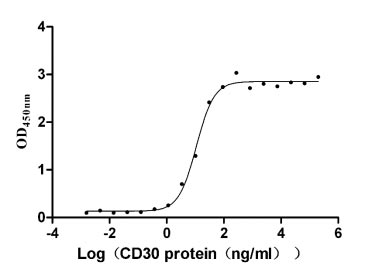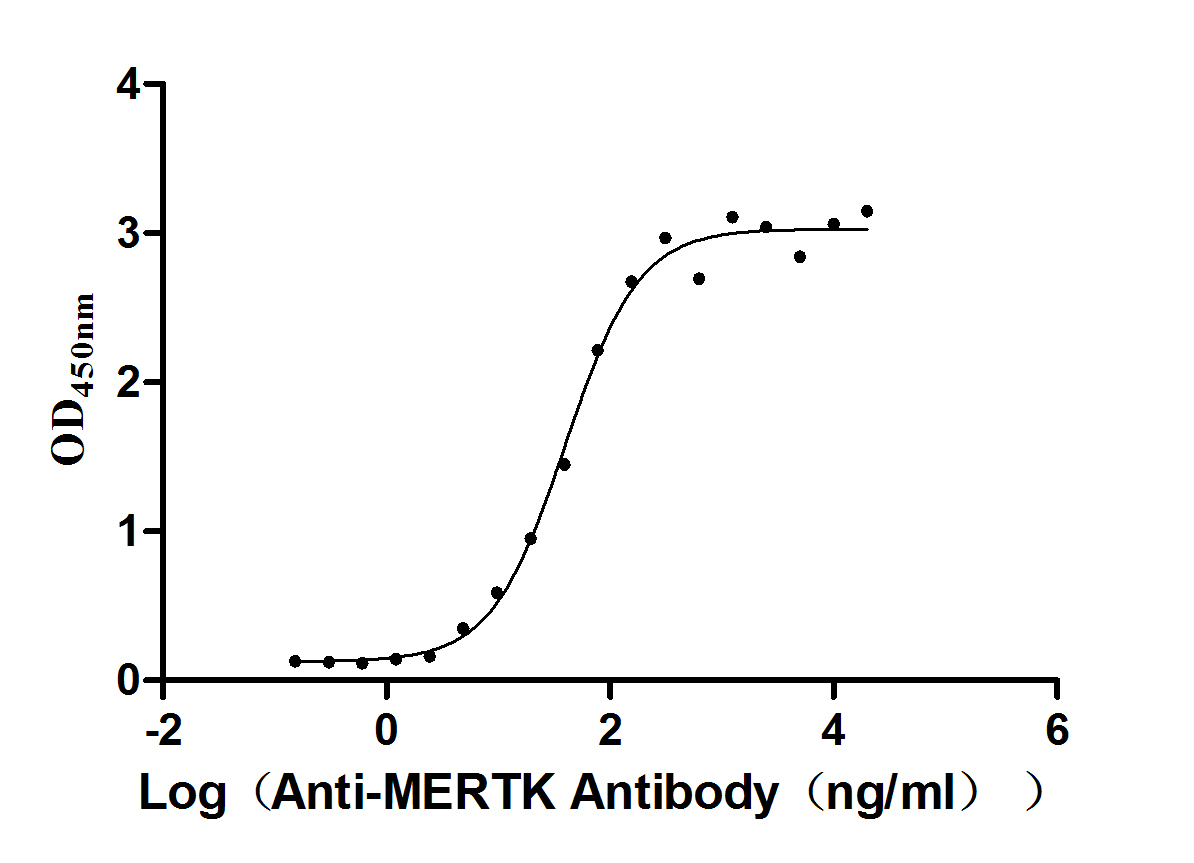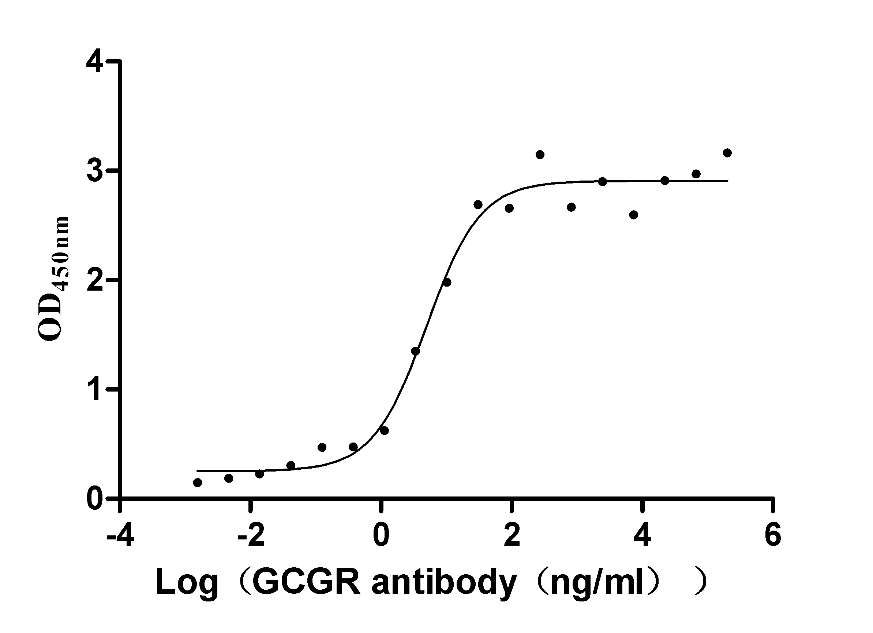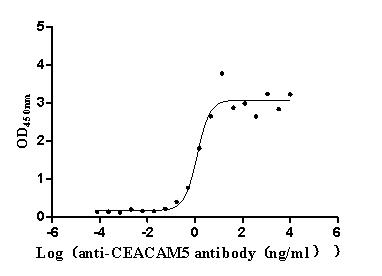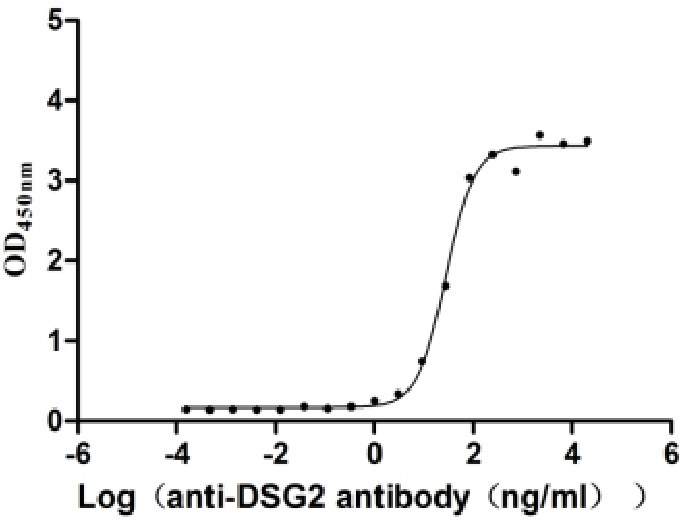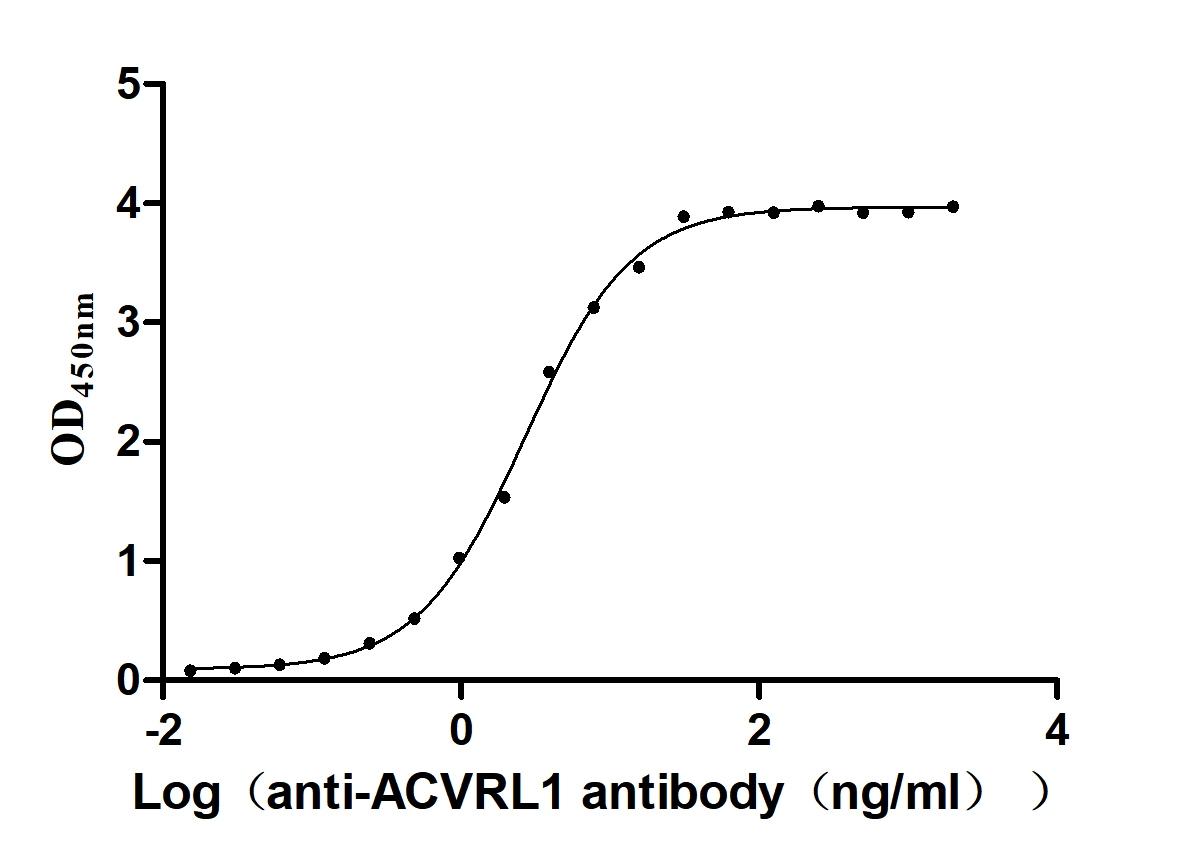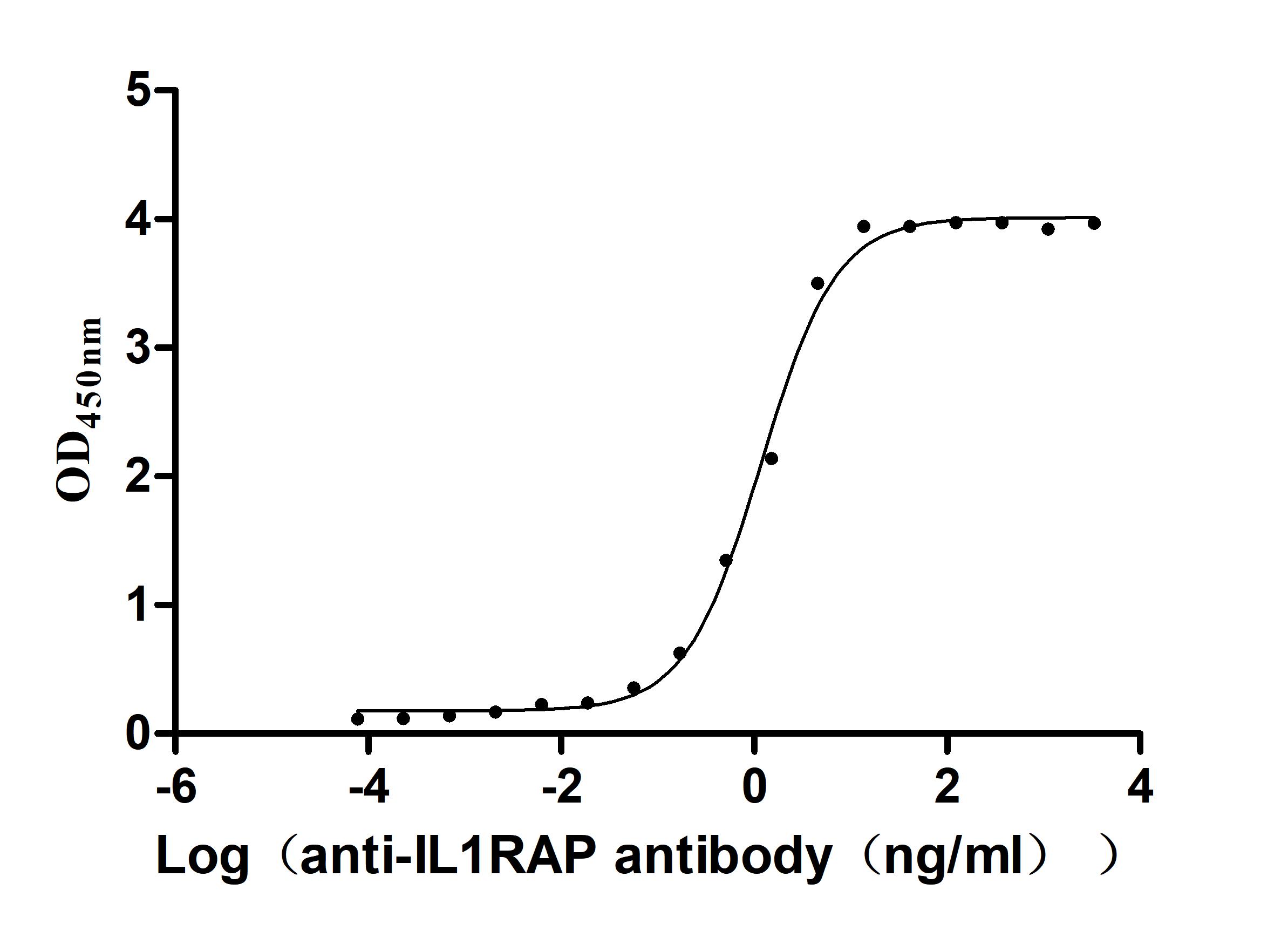Recombinant Human Echinoderm microtubule-associated protein-like 4 (EML4), partial
-
中文名稱:人EML4重組蛋白
-
貨號(hào):CSB-YP862066HU
-
規(guī)格:
-
來(lái)源:Yeast
-
其他:
-
中文名稱:人EML4重組蛋白
-
貨號(hào):CSB-EP862066HU
-
規(guī)格:
-
來(lái)源:E.coli
-
其他:
-
中文名稱:人EML4重組蛋白
-
貨號(hào):CSB-EP862066HU-B
-
規(guī)格:
-
來(lái)源:E.coli
-
共軛:Avi-tag Biotinylated
E. coli biotin ligase (BirA) is highly specific in covalently attaching biotin to the 15 amino acid AviTag peptide. This recombinant protein was biotinylated in vivo by AviTag-BirA technology, which method is BriA catalyzes amide linkage between the biotin and the specific lysine of the AviTag.
-
其他:
-
中文名稱:人EML4重組蛋白
-
貨號(hào):CSB-BP862066HU
-
規(guī)格:
-
來(lái)源:Baculovirus
-
其他:
-
中文名稱:人EML4重組蛋白
-
貨號(hào):CSB-MP862066HU
-
規(guī)格:
-
來(lái)源:Mammalian cell
-
其他:
產(chǎn)品詳情
-
純度:>85% (SDS-PAGE)
-
基因名:EML4
-
Uniprot No.:
-
別名:EML4; C2orf2; Echinoderm microtubule associated protein like 4; Echinoderm microtubule-associated protein-like 4; ELP 120; ELP120; EMAL4_HUMAN; EMAP 4; EMAP-4; EMAP4; EML 4; eml4; Restrictedly overexpressed proliferation associated protein; Restrictedly overexpressed proliferation-associated protein; Ropp 120; ROPP120
-
種屬:Homo sapiens (Human)
-
蛋白長(zhǎng)度:Partial
-
蛋白標(biāo)簽:Tag?type?will?be?determined?during?the?manufacturing?process.
The tag type will be determined during production process. If you have specified tag type, please tell us and we will develop the specified tag preferentially. -
產(chǎn)品提供形式:Lyophilized powder
Note: We will preferentially ship the format that we have in stock, however, if you have any special requirement for the format, please remark your requirement when placing the order, we will prepare according to your demand. -
復(fù)溶:We recommend that this vial be briefly centrifuged prior to opening to bring the contents to the bottom. Please reconstitute protein in deionized sterile water to a concentration of 0.1-1.0 mg/mL.We recommend to add 5-50% of glycerol (final concentration) and aliquot for long-term storage at -20℃/-80℃. Our default final concentration of glycerol is 50%. Customers could use it as reference.
-
儲(chǔ)存條件:Store at -20°C/-80°C upon receipt, aliquoting is necessary for mutiple use. Avoid repeated freeze-thaw cycles.
-
保質(zhì)期:The shelf life is related to many factors, storage state, buffer ingredients, storage temperature and the stability of the protein itself.
Generally, the shelf life of liquid form is 6 months at -20°C/-80°C. The shelf life of lyophilized form is 12 months at -20°C/-80°C. -
貨期:Delivery time may differ from different purchasing way or location, please kindly consult your local distributors for specific delivery time.Note: All of our proteins are default shipped with normal blue ice packs, if you request to ship with dry ice, please communicate with us in advance and extra fees will be charged.
-
注意事項(xiàng):Repeated freezing and thawing is not recommended. Store working aliquots at 4°C for up to one week.
-
Datasheet :Please contact us to get it.
靶點(diǎn)詳情
-
功能:Essential for the formation and stability of microtubules (MTs). Required for the organization of the mitotic spindle and for the proper attachment of kinetochores to MTs. Promotes the recruitment of NUDC to the mitotic spindle for mitotic progression.
-
基因功能參考文獻(xiàn):
- EML4-ALK fusion variant V3 is a high-risk feature for anaplastic lymphoma kinase-driven non-small cell lung cancer PMID: 29363116
- The EML4-ALK fusion gene may be a strong oncogene in younger patients with lung adenocarcinoma. PMID: 29517858
- lung adenocarcinoma in Asian patients aged 50 years, especially EML4-ALK and ROS1 fusion. Mutation analysis may be helpful in determining targeted therapy for the majority of these patients PMID: 30107055
- Mutation testing at diagnosis is feasible in the vast majority of patients with Stage IV adenocarcinoma of the lung. Patients with EGFR or EML4ALK mutation and those who received pemetrexed maintenance had better clinical outcomes. PMID: 29199690
- Our analysis indicated that ALK-EML4 positive non-small-cell lung cancers comprised a unique subgroup of adenocarcinomas with distinct clinicopathological characteristics. Incidence of ALK positivity was found to be higher in females and never smokers. PMID: 29199691
- Coupling an EML4-ALK-centric interactome with RNA interference identifies sensitizers to ALK inhibitors PMID: 27811184
- identified EML4-ALK gene rearrangement in expanded circulating tumor cells from a patient with ALK-positive lung adenocarcinoma PMID: 27507192
- Knockdown of SMYD2 as well as treatment with a SMYD2 inhibitor in two NSCLC cell lines with an EML4-ALK gene significantly attenuated the phosphorylation levels of the EML4-ALK protein. PMID: 28370702
- The EML4-ALK-mediated upregulation of HIF1alpha, HK2 and glycolytic metabolism was also highly active in vivo as demonstrated by fluorodeoxyglucose-positron emission tomography imaging of xenografts grown from EML4-ALK-positive NSCLC cells. PMID: 27132509
- We assessed the prevalence of EML4-ALK rearrangement gene measured by immunohistochemistry in an unselected population-based consecutive cohort of patients with adenocarcinoma of the lung (ACL), and the correlation with smoking history, thyroid transcription factor 1 (TTF1), gender and age PMID: 27943404
- Our findings show that group EML4-ALK variants 3a/b in non-small cell lung cancer may be a major source of ALK inhibitor resistance in the clinic. PMID: 28039177
- EML4-ALK rearrangement detection in malignant pleural effusions is a complementary method for EML4-ALK detection. VETANA and qRT-PCR are more appropriate for MPE detection. EML4-ALK rearrangement in pleural effusions has a predictive value for treatment. PMID: 27060609
- EML4-ALK-positive lung cancer is often highly progressive. PMID: 26964537
- case report in which the EML4-ALK fusion gene was identified as a second primary lung cancer after surgically resecting EGFR mutation-positive adenocarcinoma PMID: 26704814
- 79 (69%) were negative for echinoderm microtubule-associated protein like 4 (EML4)-ALK translocation, nine (8%) were positive and 27 (23%) were unevaluable. PMID: 25757141
- Data suggest that platelets are a valuable source for the non-invasive detection of echinoderm microtubule associated protein like 4-anaplastic lymphoma kinase (EML4-ALK) rearrangements and for predicting and monitoring outcome to crizotinib. PMID: 26544515
- Data show that inhibition of echinoderm microtubule-associated protein-like 4 (EML4)-anaplastic lymphoma kinase (ALK)-mediated stem-like properties enhances the anti-tumor effect. PMID: 26517679
- This review describes the biology of EML4 and ALK, explains the main features of EML4-ALK fusion proteins and outline the therapies that target EML4-ALK in cancer. [review] PMID: 26755435
- We further showed that both EML4-ALK and mutant forms of EGFR modulate PD-L1 expression via common downstream pathways mediated by MEK-ERK and by PI3K-AKT. PMID: 26019170
- EGFR gene mutations and the EML4-ALK fusion gene were detected in 92 lung adenocarcinoma patients in China. PMID: 24935562
- In the absence of EML4, NUDC was no longer able to localize to the mitotic spindle, whereas NUDC was dispensable for EML4 localization. PMID: 25789526
- It was revealed that the EML4-ALK fusion gene was observed predominantly in adenocarcinoma, non-smoking and non-small-cell lung cancers (NSCLC) patients, especially those diagnosed in the advanced clinical stage of NSCLC. PMID: 25706305
- Results suggested that chromothripsis may be a mechanism of oncogenic rearrangement of EML4-ALK. PMID: 25144242
- The FISH-based method of detecting EML4-ALK rearrangement in lung cancer may miss a significant number of patients who could benefit from targeted ALK therapy. IHC should be strongly considered, and NGS is recommended in borderline cases. PMID: 25721120
- H1299 NSCLC cells stably expressing EML4-ALK acquire epithelial-mesenchymal transition (EMT) phenotype, associated with enhanced invasive migration and increased expression of EMT-inducing transcription factors. PMID: 25735977
- Results suggest that heat shock protein 90 (Hsp90) inhibitors may overcome ligand-triggered resistance in microtubule associated protein-like 4 (EML4)--anaplastic lymphoma kinase (ALK) lung cancer cells. PMID: 24952482
- EML4 genetic translocation is a therapeutic target in the treatment of aggressive papillary cancer of the thyroid. PMID: 24633422
- Letter/Case Report: lung adenocarcinoma where EML4-ALK gene rearrangement was missed by FISH techniques but detected using reverse transcriptase PCR. PMID: 25028527
- EML4-ALK gene rearrangements do not appear to be involved in the development of primary adenocarcinoma of the urinary bladder. PMID: 23887300
- EML4-ALK fusion genepositivitymightbe higher inyoungerNSCLCpatientswithwild-type EGFR. PMID: 24388371
- EML4-ALK fusion is uncommon, reported in about 5% of NSCLC patients. PMID: 24346098
- NSCLC patients with the EML4-ALK fusion gene might be relatively insensitivite to cytotoxic chemotherapy. PMID: 24982409
- Hsp90-sensitive EML4-ALK variants are exceptions to the rule that oncogenic fusion proteins involve breakpoints in disordered regions of both partners PMID: 24706829
- The first report concerning the presence of the EML4-ALK fusion gene in a sarcomatoid carcinoma of the lung. PMID: 23664446
- evaluated mutations in four driver genes, epidermal growth factor receptor (EGFR), Kirsten ras oncogene (KRAS), c-MET, and echinoderm microtubule-associated protein-like 4-anaplastic lymphoma kinase (EML4-ALK), in Chinese lung adenocarcinoma patients PMID: 23919423
- This case suggests that echinoderm microtubule-associated protein-like 4-anaplastic lymphoma kinase fusion is an oncogenic event in not only carcinomas but also sarcomas originating from stromal cells. PMID: 24277751
- EML4-ALK rearrangement is associated with congenital pulmonary airway malformation. PMID: 23357247
- EML4-ALK rearrangements are associated with lung carcinomas. PMID: 23408463
- EML4-ALK rearrangement is associated with response to therapy in lung adenocarcinoma. PMID: 23486270
- variations in EML4-ALK fusion is associated with small-cell lung cancer with adenocarcinoma. PMID: 23154565
- EML4-ALK fusion variant is associated with non-small-cell lung cancer. PMID: 23169500
- Lung neoplasm patients who harbor EML4-ALK fusion genes generally have wild type EGFR and KRAS genes. PMID: 22736493
- EML4-ALK variant is associated with lung cancer. PMID: 22706607
- EML4-ALK-variations are associated with non-small cell lung cancer. PMID: 22722791
- EML4-ALK and low thymidylate synthase expression is associated with treatment outcome with pemetrexed in Non-Small Cell Lung Cancer. PMID: 22056890
- EML4-anaplastic lymphoma kinase (ALK) fusion gene is associated with longer overall survival of lung adenocarcinoma patients with wild-type epidermal growth factor receptor mutations. PMID: 22124476
- frequent rearrangement in lung signet-ring cell carcinoma PMID: 21036415
- New molecular targets are on investigation, such as EML4-ALK translocation. PMID: 21420271
- EML4-ALK fusion variants have a role in non-small cell lung cancer PMID: 21356191
- EML4-ALK fusion appears to be tightly associated with ALK mRNA expression levels. RACE-coupled PCR sequencing is a highly sensitive method that could be used clinically for the identification of EML4-ALK-positive patients PMID: 20624322
顯示更多
收起更多
-
亞細(xì)胞定位:Cytoplasm, cytoskeleton. Cytoplasm. Cytoplasm, cytoskeleton, spindle. Cytoplasm, cytoskeleton, microtubule organizing center. Midbody.
-
蛋白家族:WD repeat EMAP family
-
數(shù)據(jù)庫(kù)鏈接:
Most popular with customers
-
Recombinant Human Tumor necrosis factor ligand superfamily member 8 (TNFSF8), partial (Active)
Express system: Mammalian cell
Species: Homo sapiens (Human)
-
Recombinant Human Tyrosine-protein kinase Mer (MERTK), partial (Active)
Express system: Mammalian cell
Species: Homo sapiens (Human)
-
Recombinant Human Glucagon receptor (GCGR), partial (Active)
Express system: Mammalian cell
Species: Homo sapiens (Human)
-
Express system: Mammalian cell
Species: Homo sapiens (Human)
-
Recombinant Human Desmoglein-2 (DSG2), partial (Active)
Express system: Mammalian cell
Species: Homo sapiens (Human)
-
Recombinant Human Serine/threonine-protein kinase receptor R3 (ACVRL1), partial (Active)
Express system: Baculovirus
Species: Homo sapiens (Human)
-
Recombinant Human Transmembrane 4 L6 family member 1(TM4SF1)-VLPs (Active)
Express system: Mammalian cell
Species: Homo sapiens (Human)
-
Recombinant Human Interleukin-1 receptor accessory protein (IL1RAP), partial (Active)
Express system: Mammalian cell
Species: Homo sapiens (Human)


